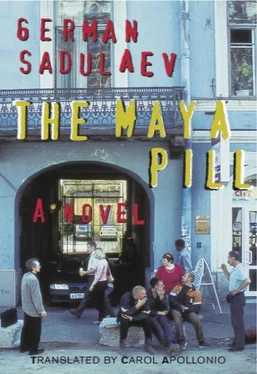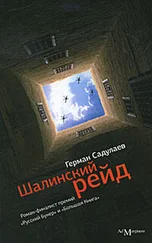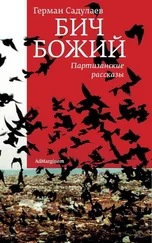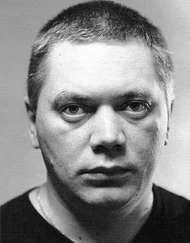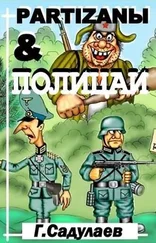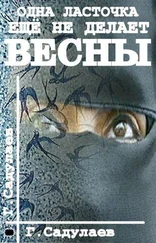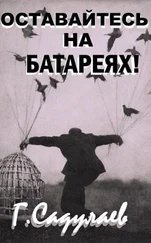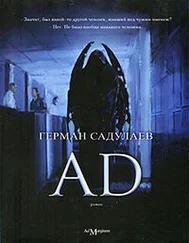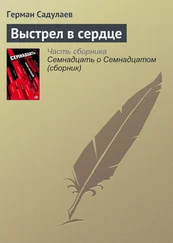And of course I have a DVD of the German movie Knockin’ on Heaven’s Door , the story of two guys living with terminal cancer and indulging in a no-holds-barred, hedonistic megabinge before they kick off.
No need to listen to a lot of different songs or read a stack of different books. One is enough, so long as you get to its essence. Take the Hari Krishnas, all they do is sing “Hari Krishna, Hari Rama” and read the Bhagavad Gita , but they each perceive and comprehend more than a full professor.
The main thing is that it be the right song or book. “Knockin’ on Heaven’s Door” is the right song. That is my opinion. If Old Bob had written nothing else, the pearly gates would still swing open before him.
When I’m done writing my one and only masterpiece, I’ll just spend the rest of my days working in an office, and my nights drinking beer, like a regular guy. Hmm…
I sipped my beer and meditated to the sound of the song as it cycled through all the different versions. Then I undressed, shut down the computer, and curled up on the sleeper sofa. My insomnia was long gone, a feature of the distant past when I didn’t work in an office from nine to six, led a bohemian lifestyle, and had sex whenever, with whomever.
Within ten minutes I was back in that strange dream about long-lost Khazaria.
A falling star appears out of the cosmos and, whipping its tail like a cat, traces a trail across the yawning blackness of the southern sky.
Every night closer, hotter.
Saat lies on his back on a hillock with his hands crossed behind his head and stares up at the sky. Misfortune, the old people would say, woe.
What kind of misfortune can befall Khazaria? You name it. A bad harvest. Or the opposite, one that’s too good—that too is woe. One year the grain grew as tall as a horse. They harvested with sabers, used maces for threshing. Couldn’t eat it all! Piled it on carts until it spilled over the tops, hauled it over the mountains, begged the people on the other side: Take our grain, we have too much! Swap it for your heavy stones! The neighbors traded, helped. Carts clogged the high roads, grain going one way, stones the other. The roads were too narrow, so the carts traveled across the fields. Trampled the rich black earth. No one could get through, on foot or by cart. The milk spoiled in the nomad camps, and mountains of stones filled the cities—nothing to eat or drink! The sick couldn’t get through to the znakhar healers, they fell to the ground between the carts and died there on the road.
No one was left to do the winter plowing and tend the livestock.
The Khazars spent their days carting grain and piling up stones. Weeds overtook the fields, the livestock ran loose. And they still couldn’t get all the grain out! The sheds burst from inside. Attracted by the excess of grain, invisible baby mice multiplied under the floorboards and turned into huge, sleek, nasty adults. They’d attack a man by his shed, gnaw his flesh to the bone, and leave him to groan and rot what was left of his life away. Out of pure malice, but also for a little fun. Every living creature needs more than bread alone. Circuses, the ancient tsar-emperors used to say. Just to entertain themselves; even mice get bored eating the same old thing. So the mice cubs devoured the grain, and famine set in. The Khazars had nothing left—no seed grain, no livestock—for the next spring. They tried to eat the stones, but the stones broke their teeth and ruined their stomachs. Some food is just too heavy.
And death came to Khazaria. Felled multitudes.
Some survived by cleverness; they used the stones to bludgeon the mice, then made fires from the parched weeds, roasted the mice, and ate them.
That’s what too good a harvest year does for you. No, for the poor Khazar, less is more. Just a taste, a splash of gruel in his bowl; leave gluttony to the Murzlas.
The next year it was announced that the Murzlas would save the people and lands from any excess, would take it on themselves. Would haul the surplus grain beyond the hills. Would take non-surplus goods too. All with a covert, sovereign aim: to make the mice multiply in the enemy’s barns, gnaw their bones, sap their strength. And our people would labor and thrive. A clever plan! And the Murzlas would get their just reward: privileges, blue flashers to attach to their mares’ tails, to clear their way on the high road.
If it weren’t for the Murzlas, all would be lost.
And for the Great Khagan too, of course.
Anything can happen. Drought or an excess of rain—both bring woe. Heat will destroy, cold will kill. Misfortune, all.
But worst of all, producing graves, widows, floods of tears, mountains of corpses, the stench of decay…
Is war.
Saat lies on his little hill, stares up at the falling star, thinks thoughts. Hoofbeats. He sits up, sees: A secret sotnya of the Khagan’s horsemen gallops by, in full conspiracy, hunched low over their horses’ withers, making not a sound. They swish their whips, gouging the sides of their horses’ bellies with their heels, urging them on, faster, faster. In their hands, torches of burning pitch.
In the morning a fire in Itil. Two villages burned to ashes, with their people.
The wind whirls bitter smoke across the steppe.
Children weep, wives wail. Men teem in the ashes, seeking their loved ones’ bones. Eyes vacant, dead.
There you have it, fruit of the falling star.
But even that fruit is but the seed of a graver woe.
The shamans disemboweled a duck, extracted its liver for fortunetelling. The liver said that those fires had been set by wicked Chechmeks nesting on high cliffs.
The duck’s liver never lies. Just to be sure, they mashed it with greens and ate it.
Sure enough, it was the Chechmeks.
In the morning, in the squares and bazaars the town criers spread the truth to the Khazar people. They recall and retell all the Chechmek wrongdoings of the past, the long enmity with our people. The Khagan’s words go around to all the households: We will not allow this insult to Khazar unity! We will subdue the evil Chechmeks, restore the eternal and proper order of things.
But for that, troops must be dispatched to the Tatar land, to the cliff-side nests where the Chechmeks lurk, boiling up evil in their cauldrons, honing their hatred on rough whetstones.
They even remember Saat, sniff out the overgrown path to his ragged tent. The requisitions man comes to confiscate all of Saat’s mares for military use. He even takes a little colt, tethers him to the back of his cart. The little creature’s legs are fragile, slender as reeds in the stream, they will break.
Saat wails: What do you need him for, what good is he for military transport? You can’t put anything on his tiny back—the thinnest Chinese silk handkerchief, much less a saddle—try it, it’ll weigh the little horse down to the ground! But the officer silences him, waves the scroll with the Khagan’s requisition order in Saat’s face. The man wants a cute little colt for his own children, is all. Such are the ways of war.
Saat sits, weeps. All night long, cursing the falling star. The star is close—any closer and it will singe his beard.
But his grief for the mares passes by morning. For Saat now has to grieve for himself.
A tysiachnik with a smooth round belly comes and mobilizes Saat, all of him, body and soul. Sends him into a slingshot regiment, issues him a sack on a string and a handful of stones—ammunition.
Troops amass in an endless throng.
Flutes whistle at dawn, the army sets off.
They march for a day, and Itil vanishes behind them.
By the roadside only small settlements. They march on through the night.
Читать дальше
